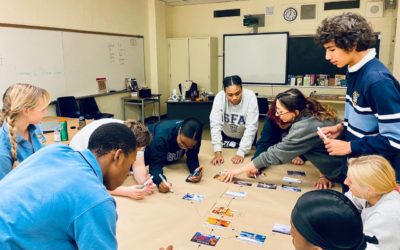Join a new citizen discussion on Wednesday, October 21, 2020 proposed in French by Tech for Good Canada. It will bring together an informed audience and four French-speaking Canadian experts to explore the addictive design (in parallel with “planned obsolescence”) of video games and online social media.
Registration for the Zoom call, free but mandatory, is available here: eSalon Discussion on Addiction By Design in Social Media and Video Games.
Tech for Good Canada invites the public to view the documentary “The Social Dilemma“, released in September on Netflix. It is a big hit because it reveals the programming techniques used by the greats of Silicon Valley (notably Facebook, Google, Instagram, Pinterest) to get us addicted to digital applications.
The experts present will be:
Magali Dufour: Professor, Université de Québec à Montréal
Magali Dufour received her B.Sc. in Psychology from the Université de Montréal in 1994 and a Ph.D. in Psychology Research Profile Intervention from the Université de Montréal in 2000. After becoming interested in addiction, Professor Dufour also became very involved in the field of research on substance-free addictions such as gambling and cyberaddiction. She has conducted large studies with poker players and cyberaddicted people.
Lois Alexanian: MA, Clinical Psychologist, Cape Town Centre in Ottawa
Working in service development at the Cape Town Centre, she was Director of Youth and Family Services at Fraternity House in Ottawa for over ten years. In addition to addiction-related disorders, she has specialized in systemic intervention with couples and groups, as well as in the area of abuse of power, either psychological, physical and/or sexual. Finally, in parallel, she continues her practice as a psychologist in private practice.
The Cape Town center treats cyberaddiction along with other addictions (alcohol and drugs) and has prevention activities in schools in the Ottawa region.
Alessandra Esposito-Chartrand, Lawyer, Calex Legal in Montreal
L.L.B., Université de Montréal; M.Sc., SDA Bocconi School of Management. Member of the Quebec Bar since 2012
Alessandra focuses her practice on corporate law, class actions, and alternative dispute resolution. She always favours the amicable settlement of disputes. Having started her career in Montreal with an international law firm, she then practiced in Paris in international arbitration before completing a master’s degree in management at the SDA Bocconi School of Management in Milan.
Alessandra joined Calex Legal in 2018. Her firm launched a class action lawsuit against Epic Games in October 2019 for failure to disclose to players and users the “risks and dangers” associated with the use of Fortnite, including the risk of addiction.
Laurie Michel: Founder of Vivala Offline, Services around the digital disconnection
Vivala Offline is a new Canadian company whose mission is to help people spend less time in front of the screens and more time in the present moment, thus promoting their mental, physical and emotional well-being.
Laurie Michel is a Franco-Canadian who has been passionate about horses since childhood and started as a professional rider. She then worked in marketing for over 12 years.
Concerned by the problems of cyberaddiction, she decided to take concrete action in 2019 by creating Vivala Offline. The mobile application, which will be launched in the fall of 2020, is intended to be fun and educational to make disconnection attractive to as many people as possible.






